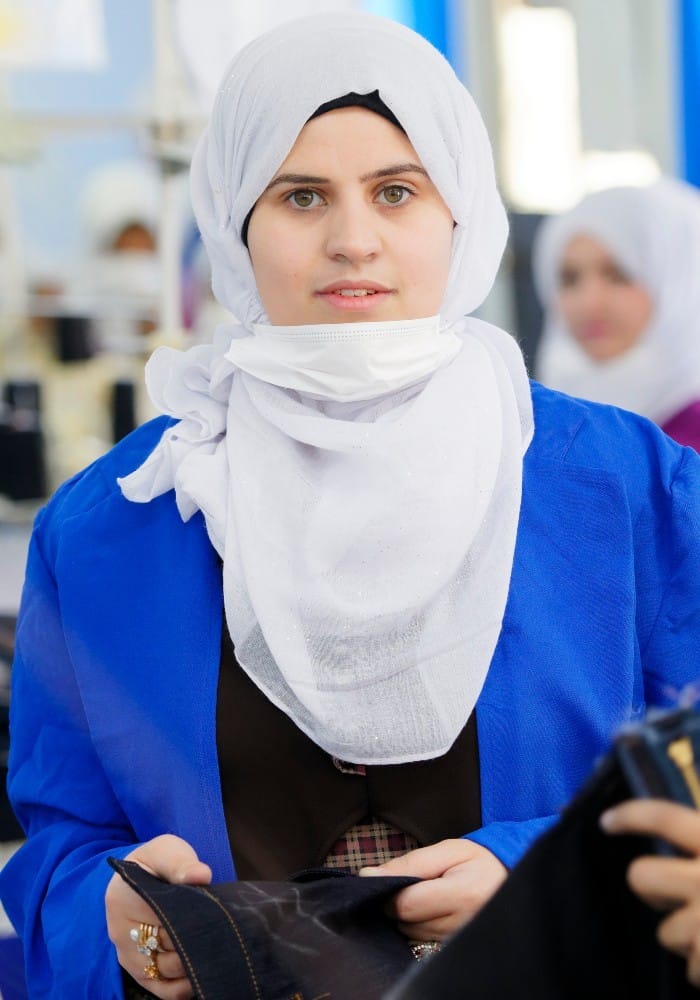
In September 2020, the Jordanian garment sector was hit by a surge of coronavirus cases among the industry’s workforce. This record spike came following a new pandemic wave worldwide that surpassed 49 million cases to date. The worrying numbers continued to grow exponentially in the kingdom, despite the Jordanian government measures to curb the spread of the coronavirus.
As of 27 October, more than 2,000 coronavirus cases have been reported in the Jordanian garment industry, out of which 1,000 cases are still active. Since the news of the outbreak, 16 factories (seven exporting factories, one subcontracting factory and eight satellite units) announced a temporarily closure of business to ensure the safety of the workers and continue conducting the PCR tests to their workers.
In response to the growing caseload across the country and within the garment sector, factories scaled up their health measures inside their plants and dormitories to ensure the safety of workers. In this respect, Better Work Jordan continued their virtual interaction with both the local factories and workers to provide support to factory management and monitor workers’ health situation in the industry.
Better Work communications with factory management
In October, Better Work Jordan team continued their on-going communication with 73 garment factories in the three industrial zones (Sahab, Dulayl and Irbid) as well as several satellite units across Jordan.
During regular calls with factory management, Better Work Jordan Enterprise Advisors (EAs) discussed factory prevention and mitigation strategies in the times of the pandemic, means of communication with the workers and the level of engagement with stakeholders in the last two weeks.
“Factory management were cooperative when I contacted them earlier in October to follow up on the operational status and workers’ health in these critical times”, says Abdeljawad Alnatsheh, a Better Work Jordan Enterprise Advisor. “Some factories even provided the information beforehand and were following the Ministry of Labour standard operating procedure (SOPs)and the Ministry of Health’s instructions”.
The majority of factory management say that they apply safety measures for mitigation and prevention inside their facilities, including enforcing mask-wearing requirements and maintaining social distance between workers. Social distancing practices include setting up partitions between workers in the production line and placing directive floor signs inside plants. Several factories also reshuffled workers working in the same factory unit and grouped them in the same dormitories to prevent contagious infection across units. 44 percent of factories set up separate quarantine areas for infected workers and 37 percent of interviewed factories set up another quarantine area for suspected cases.
78 percent of factory management are actively engaged with the Jordanian Ministries of Health and Labour through regular visits to the factory. The Ministry of Health has been responsible for conducting PCR tests for workers. While the vast majority of factory management report interactions with governmental representatives, less than half of factory management report that they have had contact with the workers’ union.
“Several factory managers demonstrated good practices in handling the health situation and succeeded in preventing the spread of the virus among their workers” Says Alnatsheh. “Unfortunately, stigma and social pressure exist among factory management and we have seen multiple coronavirus cases in one factory as a result of negligence and fear of stigma.”
Better Work Jordan communications with workers
In October, Better Work Jordan called 213 workers for semi-structured interviews, 88 percent of whom were women. The majority of these workers are from Bangladesh, followed by India, Nepal and Jordan, and they are stationed in the three industrial zones, as well as satellite units in rural areas.
Survey questions mainly focused on their personal preventative measures against COVID-19, how they receive up-to-date information about COVID-19, and the impact of the pandemic on their daily life.
“When I started making these calls, some workers were reluctant in sharing information with me”, says Sumana Akther, a Better Work Jordan consultant from Bangladesh. “But soon after that, they opened up and talked about their concerns. Most of these workers worry about receiving deducted monthly wages and getting infected by the coronavirus.”
While 97 percent of workers regularly use masks and wash their hands during their daily routine, only 35 percent of workers say that they regularly abide by social distancing, and less than five percent reported that they cover their faces when coughing or sneezing.
The majority of workers interviewed reported that they receive and learn up-to-date information about COVID-19 from social media and friends and family. Only 15 percent of interviewed workers reported receiving information from their employers in the factory floor and dormitories. Interaction with the union remains a challenge as less than one percent reported receiving information from the union. The union typically engages with workers in the factory, primarily through union management committees and when workers proactively reach out to the union.
Out of the 213 workers interviewed, 77 percent of interviewees reported income and working hours reduction and around 60 percent reported that they or a family member experience greater mental stress since the start of the COVID-19 pandemic. Nine percent of workers reported that they were suspended from their jobs.
Out of respect for the privacy of workers, the survey does not include a direct question about the personal health of workers or whether they have contracted COVID-19, but many workers volunteer this information anyways.
“I have interviewed many workers who tested positive for the coronavirus”, Says Akther. “During my calls with them, I try to comfort them through doing some exercises to relieve their mental stress”.
Better Work Jordan will continue to work with the employers and the union to monitor the health situation in the sector and ensure the safety of the sector’s workforce.